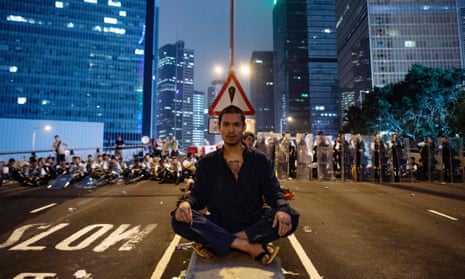Hong Kong has become a place whose present is unresolved and whose future is unimaginable. After the unexpected violence of the last week, no one can predict how the events of this afternoon, tomorrow, this week will play out. The only certainty is that Hong Kong’s way of life is under immediate threat and its people are coming out in force to defend it.
But the curse of living in the eternal immediate present is that the stakes for this “last fight” could not be higher, especially since young Hong Kongers fear that if they are defeated in this battle, there will be nothing left to lose. The failure of the Umbrella movement five years ago, when Hong Kongers occupied important thoroughfares for 79 days, seeking greater democratic participation, to win any concrete gains has raised the stakes further still this time round.
“HK is not China! Not yet!” These few words hastily scrawled on to a piece of A4 paper and tacked on to the concrete strut of a walkway aptly encapsulate the political crisis roiling Hong Kong. The territory has been plunged into instability after police fired rubber bullets and 150 rounds of teargas to break up a huge rally on 12 June, just days after a million people peacefully took to the streets to protest against extradition legislation.
“Not yet” is a reference to the terms of the joint declaration governing Hong Kong’s return to Chinese rule in 1997, which promised that the territory’s way of life would remain unchanged for 50 years, until 2047. When it was signed, in 1984, the year 2047 seemed impossibly far off, but the proposed extradition law brings 2047 much, much closer.
By permitting the rendition of anyone on Hong Kong soil to face trial in China, it would effectively remove the firewall between Hong Kong’s common law system and the mainland’s party-dominated legal system. Though the government has now suspended the bill, the process has unleashed a firestorm of fear and anger.
Since the Umbrella movement, Hong Kongers have already seen irrevocable changes to their way of life: popularly elected lawmakers have been disqualified by the courts for saying their oaths too slowly or with the wrong intonation; politicians have been forbidden to stand for election; a political party has been banned; activists have been sent to prison on public-order offences; now the police have used violence against their own people.
The unseemly rush to pass this unpopular extradition law has also weakened each of the territory’s institutions. The legislature descended into unseemly brawls, with fist fights breaking out as committees duelled. The civil service and judiciary are no longer seen as politically neutral. The police force, once seen as Asia’s finest, is an object of popular hatred, and its relationship with the public is irretrievably damaged.
The chief executive, Carrie Lam, is so unpopular that protesters carried pictures of her face stamped with the word “Liar” and 6,000 mothers turned out to accuse her of not being fit for office. Even though the bill has been put on hold, the process has already permanently devalued the institutions that HK people hold dear.
Hong Kong’s status as a city of protest is also under threat. The ability to demonstrate has become an important expression of local identity that distinguishes Hong Kong from China and over the years Hong Kongers have enthusiastically marched with performative flair, mounting shopping actions, carol singing rallies and artistic protests against censorship with blank placards. Yet the designation of Wednesday’s protest as a riot, combined with court verdicts finding activists guilty on public nuisance charges, strike at the very heart of the ability to stage a protest.
Today, any call to public action, even the act of giving speeches to a rally, requires a greater degree of caution. The young activists involved in recent protests have switched tactics to form leaderless, anonymous collectives, hiding their identities with face masks and using messaging apps to organise. The government has begun to act against these, arresting one Telegram group administrator on suspicion of conspiracy to commit public nuisance. Many activists no longer welcome their photos being taken or doing interviews with foreign media. Within the course of a week, they are becoming as cautious as mainland Chinese dissidents. By shutting young people out of the political process, the government may well have created an underground resistance that sees that radical action can have results.
But the core values that Hong Kongers cherish include universal values, press freedom, judicial independence and civil rights. These are seen by Beijing as among the “seven unmentionables”, putting Hong Kongers on the frontline of the clash between western “universal” values and the Communist party’s need for total control.
Faced with these existential threats, Hong Kong’s default position has in recent years been a defensive crouch. “We don’t have a grand strategy,” the political scientist Ray Yep from City University told me before this round of protests had broken out. “In every situation, you just defend what you can the most. This is how you defend Hong Kong values. We defend what we have. It’s defensive but it can be offensive as well.” When one in seven of the population turns out to protest against the extradition legislation, defence becomes attack, particularly in the eyes of Beijing.
The protest messages on the pieces of paper flapping on the overhead walkway underline the confusion, shock and anger reverberating through the territory in the wake of last week’s violence. “Stop shooting students.” “Is protesting a crime?” “Is speaking a crime?”
But equally, there’s a flinty determination that underpins the realisation that, even if this struggle over the extradition law is won, there will be the next fight, then the next. Because Hong Kong is not China yet. Not yet, but 2047 moves ever closer at an accelerating pace. One message simply said: “Keep going till the end.”
Louisa Lim is the author of The People’s Republic of Amnesia
